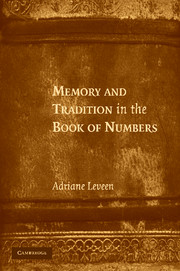Book contents
- Frontmatter
- Contents
- Acknowledgments
- ONE Desert Bound
- TWO Weaving by Design
- THREE Priestly Purposes
- FOUR Variations on a Theme: Shaping Memory in the Wilderness
- FIVE Crisis and Commemoration: The Use of Ritual Objects
- SIX Falling in the Wilderness: The Politics of Death and Burial
- SEVEN Inheriting the Land
- APPENDIX A The Priestly Sphere of Activity in the Book of Numbers
- APPENDIX B The Use and Variation of God's Address to Moses and to Aaron
- APPENDIX C Death Reports
- APPENDIX D Proper and Improper Treatment of the Dead
- Notes
- Bibliography
- Index
- Scriptural Index
- Selected Hebrew Index
THREE - Priestly Purposes
Published online by Cambridge University Press: 21 July 2009
- Frontmatter
- Contents
- Acknowledgments
- ONE Desert Bound
- TWO Weaving by Design
- THREE Priestly Purposes
- FOUR Variations on a Theme: Shaping Memory in the Wilderness
- FIVE Crisis and Commemoration: The Use of Ritual Objects
- SIX Falling in the Wilderness: The Politics of Death and Burial
- SEVEN Inheriting the Land
- APPENDIX A The Priestly Sphere of Activity in the Book of Numbers
- APPENDIX B The Use and Variation of God's Address to Moses and to Aaron
- APPENDIX C Death Reports
- APPENDIX D Proper and Improper Treatment of the Dead
- Notes
- Bibliography
- Index
- Scriptural Index
- Selected Hebrew Index
Summary
From time to time in the Torah, God will appear to an individual and strike up a conversation. Sometimes God makes a demand that includes ritual or legal instruction. At other times God takes the opportunity to communicate divine intentions or feelings. In Numbers, God conveys a special attachment to, and appreciation of, both the prophet Moses and the priest Phinehas, grandson of Aaron. In the first instance, after witnessing Miriam and Aaron challenge the sole authority of Moses as prophet in the camp, God rises to Moses' defense, severely rebuking the two of them and punishing Miriam. God angrily (and poetically) informs them: “When a prophet of yhwh arises among you, in a vision to him I make Myself known, in a dream I speak with him. Not so with My servant Moses. Throughout My house he is trusted” (Num. 12:6–7).
In the second episode, it is the turn of the priest Phinehas, grandson of Aaron, to rise to God's defense. Phinehas slays two idolaters within the camp. While such an act might jar the sensibility of a modern reader, God rewards Phinehas, graciously announcing: “behold I give him my covenant of friendship. And it shall be for him and his seed after him a covenant of priesthood for all time” (Num. 25:12–13a).
Thus both prophet and priest are singled out for God's special attention. Both episodes are located in the middle of the book of Numbers in the midst of a widespread crisis in the wilderness camp.
- Type
- Chapter
- Information
- Memory and Tradition in the Book of Numbers , pp. 47 - 64Publisher: Cambridge University PressPrint publication year: 2007

